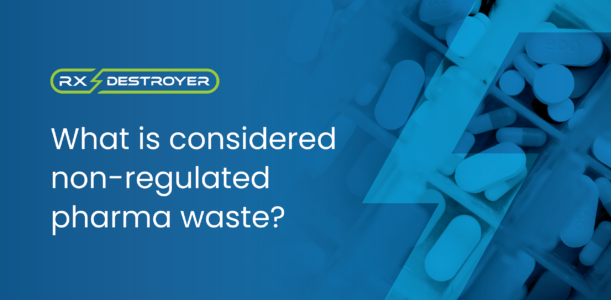What is Considered Non-Regulated Pharmaceutical Waste?
November 13, 2023 | Pharmaceutical Waste Disposal

What is Pharmaceutical Waste?
Pharmaceutical waste refers to any unused, expired, or contaminated medications that need to be properly disposed of to prevent harm to the environment and ensure public safety. It includes various types of pharmaceutical products, such as pills, capsules, injectables, liquids, patches, and other forms of medications. Pharmaceutical waste can be categorized into two main types: hazardous waste and non-hazardous waste.
Hazardous waste includes medications that are considered harmful, toxic, or pose a risk to human health and the environment. These may include certain chemotherapy drugs, narcotics, or medications that contain heavy metals or other hazardous substances. Non-hazardous pharmaceutical waste refers to medications that are not classified as hazardous but still need to be disposed of properly to prevent misuse, contamination, or environmental damage.
RCRA Waste and Non- Regulated Waste
Proper disposal of pharmaceutical waste is of utmost importance in accordance with federal regulations. To better classify pharmaceutical waste, we can categorize it as either RCRA or non-RCRA waste. The Resources Conservation and Recovery Act (RCRA) is a legislation overseen by the Environmental Protection Agency (EPA) that governs the appropriate treatment and disposal of hazardous pharmaceuticals.
Even non-hazardous or non-RCRA pharmaceutical waste must still be disposed of properly and is subject to regulations by the EPA and the Drug Enforcement Administration (DEA). In the past, many medications could be easily flushed down the drain as a means of disposal, resulting in severe water contamination and increasing the risk of dangerous drug diversion. However, federal regulations now require all pharmaceutical waste to be disposed of appropriately in accordance with 21 CFR and 40 CFR. Any disposal method that renders medications non-retrievable aligns with DEA regulations.
Approximately 85% of pharmacy waste from hospitals consists of non-RCRA medications, which include various categories:
- U- and P-listed medications where the listed chemicals are not the sole active ingredient
- Medications classified as hazardous by the Occupational Safety and Health Administration (OSHA)
- Drugs with an LD50 rating below 50 mg/kg
- Drugs categorized as carcinogenic by the S. Department of Health and Human Services
- Mineral or vitamin supplements that contain selenium, cadmium, or chromium beyond toxicity test limits
How Can Rx Destroyer Help?
Although some pharmaceuticals may be legally classified as non-RCRA drugs, they still require proper disposal to safeguard our waterways and prevent drug diversion.
To ensure compliant disposal of pharmaceutical waste, it is necessary to adhere to federal, state, local, and tribal regulations. Rx Destroyer is committed to assisting organizations in meeting all drug disposal laws and regulations, preventing environmental contamination and drug diversion. We offer an easy-to-use disposal system with convenient containers that instantly render medications non-retrievable, ensuring compliance with DEA and EPA regulations.
What sets us apart from other pharmaceutical waste management companies is our dedication to informing and consulting our clients on compliant drug disposal solutions. We take pride in sharing our expertise and industry best practices in proper pharmaceutical waste disposal, helping our customers navigate the complexities of regulatory compliance.

